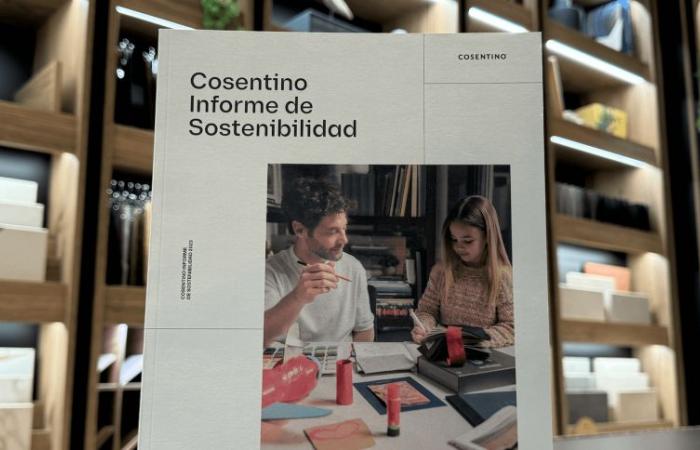
Cosentino, a company specialized in the production and distribution of sustainable surfaces for architecture and design, publishes its Sustainability Report for the year 2023. This work reinforces its commitment to inform annually, and with transparency, its different interest groups about the evolution of its strategic objectives, as well as the economic, social and environmental performance based on the ESG principles (Environmental, Social and Governance).
The report is based on the reporting model of Non-Financial Information Statement (EINF), in compliance with Law 11/2018 of December 28, and has the Global Reporting Initiative (GRI) standards as a reference. The data shown, externally verified by KPMG, demonstrates its progress in carbon footprint reduction, circular economy or low-impact product design; advances as an employer brand and training; as well as exhibiting different projects that generate a positive impact on society through education, art or culture.
Decarbonization and Circular Economy
The sustainability management It continues to be one of the axes with the greatest investment effort. In 2023, the company invested close to 30 million euros (29.4M) in environmental assets and health and safety, and 13.5 million in environmental control and improvement.
This bet translates into a new reducing your carbon footprint ratio: a 1.3% compared to 2022, and 10.3% compared to 2018, the base year of measurement. For its part, 78% of its carbon footprint in 2023 was due to indirect emissions from its value chain (Scope 3).
In this area, in addition to milestones already achieved such as the use of a 99% of water reused and Zero Discharge into rivers and seas (with a daily recirculation of 80,000m3), or the 100% renewable electric energyit is worth highlighting the completion of the project industrial photovoltaic installation for self-consumption. In 2023, the second phase was completed, consisting of the additional installation of 28,000 panels on the roofs of the factories and centers of the Cosentino Industrial Park in Cantoria. With this, the company It already obtains 20% of its current electrical consumption on its own annually from this renewable source.
It is progressively extending this commitment also to its “Centers” or warehouses in Spain (21 in total), with the installation of solar panels for self-consumption. Finally, in this field of new energy sources, it is worth noting that the company is immersed in different lines of research and study to implement a clean energy mix. On the other hand, Cosentino activated a Own Urban Wastewater Regeneration Station (ERAR), which manages to give a second life to the wastewater of the bordering towns of Olula del Rio, Macael and Fines.
The company also continued to advance in the recovery and reuse of your waste. In 2023, Cosentino increased its recovery ratio for all solid waste generated in production processes up to 16.5%. In addition, increased the use of recycled raw materials up to 9.6% or recovered in the manufacturing of its Silestone® and Dekton® products. This means that currently 60% of the Dekton® ultra-compact surface portfolio contains a minimum of 5% recycled raw material. For its part, in the Silestone® hybrid mineral surface, 45% of the portfolio contains a minimum of 40% recycled raw materials.
Job creation and training
Commitment to people, their employability and their training is one of Cosentino’s main values. Again in 2023, the company maintained its commitment to quality employment by increasing its workforce by 188 new jobsreaching a total of 6,039 employees worldwidewhich represents an increase of 27.4% since 2020. Of them, the 58% are located in Spain, more specifically at the Cosentino headquarters and Industrial Park in Cantoria. 98% of the group’s entire workforce has a permanent contract.
In terms of equality and diversity, the staff is made up of professionals from 78 different nationalitiesand raised the ratio of positions held by women up to 23.5% (+1.5% vs 2022). During the past year they launched 39 initiatives within the company’s Equality plans. Regarding internal training, the company dedicated 70,000 hours for the training of its workersof which 8,186 were dedicated to Health and Safety, more than doubling the hours allocated to this issue last year.
A commitment that is also reflected in the search for social and economic prosperity for the communities where Cosentino is present, highlighting its immediate surroundings. Cosentino contributes in a pioneering way in training, for example, with the realization of Dual FP programs carried out at their facilities. In the current 23/24 academic year, the company maintains 5 degrees, 4 of them in dual mode, with the participation of more than 190 students. He 85% of the young people who take these Dual FP or FCT cycles end up being part of the workforce.
Likewise, at the university level, Cosentino promotes initiatives such as Ingenuity or Impulseone-year paid corporate development programs aimed at recent graduates in STEM careers and with a vocation in the industrial sector, or to recent university graduates with different profiles to begin their career in the corporate, industrial and commercial areas.
On the other hand, it is also worth highlighting the actions developed through its Eduarda Justo Foundation, where its different lines of aid stand out, such as Eduardo Justo Scholarships waves Canada TECH Scholarships, which allowed 236 young people last year to train in different international entities. Likewise, 160 young people from 22 schools in the province have also participated in other training activities of the Foundation.
Contribution to society
Cosentino supports disciplines such as architecture, design, sports or gastronomy with a multitude of collaborations and sponsorships, highlighting its own projects such as the Silestone Institute or the Cosentino Design Challenge contest (CDC). For its part, it promotes art and culture thanks to the activity of the Ibáñez-Cosentino Art Foundation. Throughout 2023, the Foundation has developed an extensive cultural program divided into three large areas: temporary exhibitions, cultural revitalization, and didactics and mediation. This program has been developed in the different cultural spaces it manages: the Ibáñez Museum, the Pérez Siquier Center and the Almería Art Collection – located in the City of Culture of Olula del Río – and the two headquarters of Almería capital, the Doña Pakyta Art Museum and Space 2. The Foundation organized a total of 35 exhibition and cultural activities during the past year in the aforementioned spaces that it manages.
To these museums we must add, starting this year, the management of the Museum of Contemporary Spanish Realism (MUREC), inaugurated last March. On the other hand, another of the milestones of the last year was the constitution of the Almería Tierra Abierta Foundation, of which Cosentino has been one of the main promoters, and whose objective is to work on finding solutions to settlements in the province from Almeria. Finally, it should be noted that in 2023 the company undertook a volume of 1.5 million euros in direct donations to different entities and associations.
Access more responsible information in our digital library of Corresponsables publications and in the Cosentino Practical Case in the Corresponsables 2024 Yearbook.





